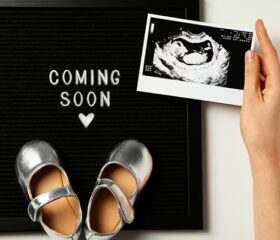Frequently Asked Questions about Weight Gain in Pregnancy
Want to find out how much weight you need to gain at each stage of your pregnancy? Find out with our pregnancy weight gain calculator.

- How does this pregnancy weight gain calculator work?
- How much weight should you gain during pregnancy?
- Why is the average weight gain so low in the first trimester?
- How does your BMI determine how much weight you should gain in pregnancy?
- How much weight should you gain if you’re carrying twins?
- Why is weight gain important during pregnancy?
- Where will your weight gain get distributed during pregnancy?
- What happens if you gain too little weight during pregnancy?
- What if you gain too much weight during pregnancy?
- How should you manage your weight gain during pregnancy?
- When should you speak to your doctor about your weight gain?
- What do moms on Glow say about their pregnancy weight gain?
How does this pregnancy weight gain calculator work?
Our calculator takes your pre-pregnancy weight, current weight, and gestational age (how many weeks pregnant you are), then uses an equation based on data from the Institute of Medicine (IOM) to produce a chart that illustrates how much weight you should aim to gain in each week of your pregnancy.
This represents the IOM’s estimate of your ideal weight gain curve. However, it’s no substitute for personalized medical advice; follow your doctor’s guidelines if they differ from this.
Note that our tool will start calculating your projected weight gain from week 0 of your pregnancy, which is technically before you actually conceive (that happens in week 3 of your pregnancy). What matters is your overall weekly average, not your weight gain in any particular week.
How do you find out your gestational age?
As noted, to use this calculator, you’ll need to know your gestational age, which is how many weeks pregnant you are.
Pregnancy isn’t measured from the moment of conception (i.e., when the sperm met the egg), but from the date of your last menstrual period (LMP). If you know when the first day of your last period was, you can simply count forward from that.
If you’re not sure, ask your doctor. Gestational age can also be estimated with an ultrasound, which you’ll usually get when you’re between 6 weeks and 12 weeks pregnant.
What should you do if you don’t remember your pre-pregnancy weight?
If you didn’t record your pre-pregnancy weight (and don’t remember it), take your best guess. The more accurate the information you enter into the calculator is, the more reliable your results will be, but they don’t need to be exact for this tool to show you a useful estimate of how much weight you should gain.
How much weight should you gain during pregnancy?
On average, you can expect to gain between 25 and 35 lb over the course of your pregnancy. However, the exact number depends on your starting weight. The less you weighed to begin with, the more you’ll need to gain.
In your first trimester, you should expect to gain around 1.1 lb to 4.4 lb in total, depending on your pre-pregnancy weight. 1
You’ll start gaining more weight in your pregnancy once you get into your second trimester (which starts after 12 weeks). If you were at a healthy weight before you got pregnant, you should expect to gain about 0.5–1 lb per week in the second and third trimesters. 2
Speak with your doctor throughout your pregnancy about how much weight you need to gain. They’ll be able to give you tailored guidelines to follow. You can make sure you hit those milestones by regularly recording your weight in your journal or a pregnancy tracker app.
Why is the average weight gain so low in the first trimester?
The average weight gain in the first trimester is very low, partly because of how pregnancy is measured. Again, you’re not actually pregnant until 2 weeks after your LMP, so early weight gain estimates are quite fuzzy.
Beyond that, in the first trimester, many moms-to-be have morning sickness (nausea), which can make it hard to eat enough to gain much weight.
Don’t worry too much about your weight in this period. Focus on maintaining a healthy diet and checking in with your doctor regularly. As long as your weight gain is within the average range for each week of your pregnancy, there’s probably nothing to worry about.
How does your BMI determine how much weight you should gain in pregnancy?
The amount of weight you should put on during your pregnancy depends on your weight before you got pregnant. Usually, doctors will use your body mass index (BMI) to assess how much weight you should gain. This is calculated based on your height and weight.
To figure out your BMI, you can perform this calculation: 3
- Multiply your weight (in pounds) by 703
- Divide it by your height in inches (1 foot equals 12 inches)
- Divide that number by your height in inches again
- Round that number down to the nearest 1 decimal place (e.g., 12.93 is equivalent to a BMI of 12.9)
Here’s how much you should expect to gain in a singleton pregnancy based on your BMI: 1
| Weight category | Pre-pregnancy BMI | Average weekly weight gain (whole pregnancy) | Average weekly weight gain (trimesters 2–3) | Total projected weight gain |
|---|---|---|---|---|
| Underweight | <18.5 | 1–1.3 lb | 1 lb | 28–40 lb |
| Normal weight | 18.5–24.9 | 0.8–1 lb | 1 lb | 25–35 lb |
| Overweight | 25–29.9 | 0.5–0.7 lb | 0.6 lb | 15–25 lb |
| Obese | 30+ | 0.4–0.6 lb | 0.5 lb | 11–20 lb |
Limitations of BMI
Keep in mind that BMI doesn’t differentiate between lean body mass (e.g., muscle) and fat. If you’re very muscular, you’ll have a very high BMI despite having very little body fat. 3 This can affect how much weight you should gain throughout your pregnancy.
In general, BMI is a useful tool for determining how much weight to gain, but it isn’t a substitute for your doctor’s guidance.
How much weight should you gain if you’re carrying twins?
If you’re pregnant with twins, you’ll need to gain more weight than if you’re carrying a single baby.
Here’s roughly how much you should aim to gain in a twin pregnancy: 1
- 37–54 lb for women of normal weight (18.5–24.9 BMI)
- 31–50 lb for overweight women (25–29.9 BMI)
- 25–42 lb for obese women (30+ BMI)
Note that there is no universal weight gain recommendation for underweight women carrying twins. If you’re underweight and pregnant with twins, you’ll need to speak to your doctor for tailored weight-gain advice.
What if you’re carrying triplets or more?
If you’re expecting triplets or more, there isn’t sufficient data on how much weight you should gain to give a recommendation. Once your doctor confirms you’re carrying multiples, they’ll let you know how many pounds to pack on.
Why is weight gain important during pregnancy?
Growing a tiny human inside your body takes a lot of work, and you need to support your baby’s development. You’ll need to take in extra nutrition to do this.
If you’re gaining weight at a healthy rate each week of your pregnancy, this suggests that your baby, placenta, and amniotic fluid are developing as expected. Moreover, this weight gain also reflects that your blood volume and fat stores are increasing as they should.
Where will your weight gain get distributed during pregnancy?
Your baby will take a fairly large share of the weight you put on during pregnancy. You can expect him to account for about around 7.5 lb of it.
Check out the table below to see how all of those pounds get distributed (based on a total gain of 30 lb during pregnancy): 4
| Area of growth | Weight (lb) | Percentage of weight |
|---|---|---|
| Placenta | 1.5 | 5% |
| Amniotic sac | 2 | 7% |
| Uterus | 2 | 7% |
| Breast tissue | 2 | 7% |
| Blood volume | 4 | 13% |
| Fluids in maternal tissue | 4 | 13% |
| Maternal fat stores | 7 | 23% |
| Baby | 7.5 | 25% |
Note that these figures apply to singleton pregnancies. For twins or multiples, you can expect your overall weight gain to be higher.
What happens if you gain too little weight during pregnancy?
If you gain less than your doctor recommends, this could cause problems for your baby, such as:
- Low birth weight
- Increased risk of developmental issues
- Higher risk of health complications
- Preterm birth
Reach out to your doctor if you don’t gain enough weight (in line with the average for your BMI) or your weight gain stalls over a few weeks.
What if you gain too much weight during pregnancy?
Packing on too many pounds during pregnancy puts you at risk of complications like gestational diabetes and preeclampsia (a dangerous pregnancy complication characterized by high blood pressure).
Make sure you also speak to your doctor if you’re gaining more than 3–5 pounds a week, as it could be a sign of preeclampsia (which causes excessive weight gain due to fluid retention), especially if you also have symptoms like vision changes or headaches. 5
How should you manage your weight gain during pregnancy?
Now that you’re clear on why weight gain is an essential part of pregnancy, let’s take a look at how you can safely pack on the pounds.
Follow a balanced diet
One of the best ways to keep your weight gain in check is by following a healthy pregnancy diet packed full of nutrients.
During pregnancy, your daily caloric intake should be higher than usual. On average, you’ll need: 6
- 1,800 calories per day in the first trimester
- 2,200 calories per day in the second trimester
- 2,400 calories per day in the third trimester
That’s if you have a singleton pregnancy. If you’re carrying twins, you’ll need an additional 600 calories, and an extra 900 if you’re carrying triplets. 7
Make sure your diet is full of whole grains, lean proteins, fruits, vegetables, and pasteurized dairy products, as these will make it easier for you to healthily gain weight. While it’s OK to give in to your cravings in moderation, limit processed and sugary foods, as these won’t satisfy your nutritional needs.
Stay moderately active
Though carrying a tiny human 24/7 can easily wear you out, that doesn’t mean you should go full-on couch potato.
Stay active by incorporating moderate exercise into your daily routine. The American College of Obstetricians and Gynecologists (ACOG) recommends that you get at least 150 minutes of moderately intense aerobic exercise per week. 8
Brisk walking or gardening (e.g., weeding, raking, or digging) are great options, though you could also try other pregnancy-safe workouts like: 8
- Swimming
- Stationary bicycling
- Prenatal yoga or Pilates
Before you start any new exercise routine, run it past your doctor first. If you feel any pain or discomfort while exercising, don’t be afraid to stop.
When should you speak to your doctor about your weight gain?
Maintain close contact with your doctor throughout your pregnancy to ensure you’re gaining enough weight, and bring up any concerns with them at your next prenatal checkup.
You should tell your doctor if:
- Your weight stalls over a few weeks (or you lose weight past the first trimester)
- You’re gaining too much weight
You should also let your doctor know immediately if you’re experiencing severe morning sickness.
While pregnancy-induced nausea is very common, some women experience an extreme form of it called hyperemesis gravidarum (HG). This can cause persistent vomiting, which can make it hard or impossible to hit your weight-gain targets. 9
What do moms on Glow say about their pregnancy weight gain?
Everyone experiences weight gain during pregnancy differently, and what’s “normal” for one mom-to-be might not necessarily be right for you.
Don’t focus too much on hitting a specific number; as long as your doctor isn’t concerned about your weight gain, there’s probably nothing for you to worry about.
Here’s what other moms on Glow have to say about their pregnancy weight gain:
- “I’m 15.5 weeks and have gained about 8lbs. My appetite has increased SO much.”
- “I lost 10lbs in my first trimester because of morning sickness and haven’t gained anything back yet. I’m 16 weeks now. I’m a healthy weight and baby is healthy so my doctor isn’t worried.”
- “I gained 10 within 4 weeks which made me concerned. My doctor said that babies and your body go through growth spurts and it can cause a sudden weight gain. My doctor measured my belly and said the size of it is measuring on a little ahead, but baby is measuring on target. As long as baby and momma are healthy, I think it’s fine.”
- “I’ve gained about 4.5kg (approx 10 pounds) and I’m currently 17w3d. I didn’t lose my appetite in the first trimester, and it’s out of control now!!”
- “I’m 26wks tomorrow and gained 25lbs. I have gained 40lbs with each of my pregnancies (this is my fifth).”
- “I am 24 weeks and 6 days and gained 20 weeks. I think this is probably average. The weight you say you feel on your cheeks etc is water weight and all natural. Nothing to worry about my Midwife says.”
Stories taken from these threads on Glow’s message board:
Article Sources
- American College of Obstetricians and Gynecologists. "Weight Gain During Pregnancy" Retrieved August 20, 2025.
- American College of Obstetricians and Gynecologists. "How much weight should I gain during pregnancy?" Retrieved August 20, 2025.
- Cleveland Clinic. "Body Mass Index (BMI)" Retrieved August 20, 2025.
- Texas WIC. "Where Does the Pregnancy Weight Go?" Retrieved August 20, 2025.
- MedlinePlus. "Preeclampsia" Retrieved August 20, 2025.
- Mount Sinai. "Managing your weight gain during pregnancy" Retrieved August 20, 2025.
- American College of Obstetricians and Gynecologists. "Nutrition During Pregnancy" Retrieved August 20, 2025.
- American College of Obstetricians and Gynecologists. "Exercise During Pregnancy" Retrieved August 20, 2025.
- Cleveland Clinic. "Hyperemesis Gravidarum" Retrieved August 20, 2025.







